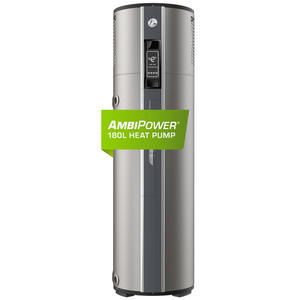

The AMBIPOWER MDc-180 Heat Pump is the new generation 178L capacity heat pump suitable for small families. This is available in the Rheem AmbiPower MDc-180 Model No: 551180 in R134a refrigerant and Low GWP (Global Warming Potential) of <700 GWP using R513a in the Rheem AmbiPower MDc-180 Model No: 551D180.
This is a smart, energy efficient alternative for areas where a traditional solar water heater may not be suitable. It uses the heat from the surrounding air and doesn’t rely on direct sunlight to heat your water and provides a reliable, efficient, and sustainable way to reduce your water heating energy consumption.
The advanced wrap around microchannel heating technology for uniform and faster water heating making it suitable for cold climates with an operating range from -7°C to higher ambient temperatures.
Watch the video here to see how AmbiPower works.
Features at a Glance

Capacity

No. of People ✕

Warranty*
Features
- High COP of 4.5 @ 19oC1
- Advanced wrap around microchannel heating technology for uniform and faster water heating
- Can save up to 70% on your water heating energy consumption compared to an electric water heater in Zone 32
- Suitable for cold climates with an operating range from -7°C to +43°C
- Suitable for harsh water conditions
- 2.4 kW back-up element
- User-friendly touch screen LED display
- Eligible for STCs (may be eligible for additional incentives in some states)
- 7 year cylinder warranty*
- Suitable for 1 to 4 people
- Available in Model No: 551180 R134a & Low GWP of 629 refrigerant using R513a in Model No: 551D180
Warranty*
- 7 years cylinder supply
- 3 years cylinder labour
- 3 years sealed system supply and labour
- 1 year parts supply and labour
2 Energy savings of up to 70% in Zone 3 based on TRNSYS modelling on hot water energy consumption when replacing an electric water heater (min 16 hours/day). Any savings will vary depending upon your location, type of water heater being replaced, hot water consumption and fuel tariff.
Owners and Installation Guides
Running Cost Estimator
Select your State
Running Cost Estimator Disclaimer as at 01/10/2023
Things that you should know about the Rheem Running Cost Estimator
The estimator is provided as a guide only to help you compare estimated running costs between various water heater types.
The estimator is based on Australian Standard AS5263, which relies on certain assumptions, such as an average daily load of 200L and 19 tap turns. Your situation and usage may be different to these assumptions, so the estimator may not match your actual daily loads and pattern of use.
Accordingly, the estimator cannot and does not purport to provide an accurate assessment of your yearly hot water energy bill. It does, however, allow a reasonable comparison between various water heater types based on Australian Standard AS5263 and average fuel tariffs used in the estimator.
Your state has been used to determine the temperature rise required to heat water from cold to a temperature of 65C, the applicable charge for the tariff type selected and the amount of solar savings.
Solar savings are based on Australian Government approved modelling for the type of solar water heater selected and the booster type. All electric boosted solar water heaters are modelled with a continuous tariff, but may be suitable for use on other tariff types depending on the model selected, your climate zone and the amount and usage pattern of hot water use.
Tariffs are current as at 9th March 2023 and represent an average price for the fuel type for the capital city in the state or territory, including GST.
Fixed charges, system access charges, delivery fees and any other fees and charges, including special rates and discounts are excluded from the estimator.
Energy consumption figures used are for a typical water heater within a category and do not reflect a specific model. Actual energy use may vary.
Heat Pump and solar water heaters may be suitable for Off Peak/Shoulder Rate tariffs depending on the type of water heater selected and the location. You should consult with your energy provider or installer before making any decision.



